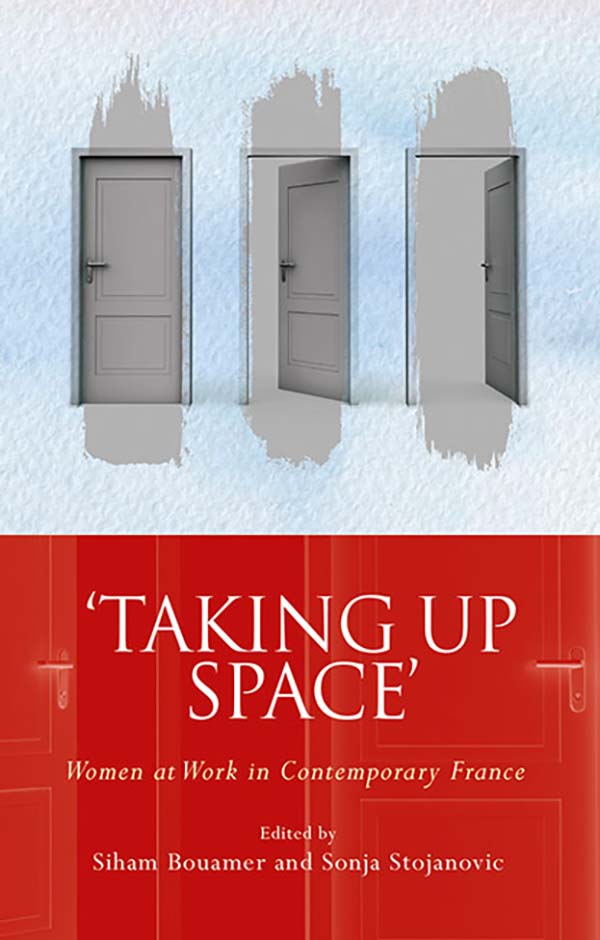‘Taking Up Space’
Women at Work in Contemporary France
Editor(s) Siham Bouamer,Sonja Stojanovic
Language: English
Genre(s): Gender Studies
Series: French and Francophone Studies
- November 2022 · 360 pages ·216x138mm
- · Hardback - 9781786839077
- · eBook - pdf - 9781786839084
- · eBook - epub - 9781786839091
Focusing on representations of women’s experiences in contemporary France, ‘Taking Up Space’ examines how women inhabit a variety of work spaces. It also speaks to the importance of cultural productions in calling out labour issues affecting women, as well as in offering a platform that allows us to imagine a future where inclusive and equitable work spaces are the norm. Drawing on Sara Ahmed’s phenomenological use of objects, the book explores women’s experiences through different metaphors of the door related to labour. The contributors demonstrate how doors are not only closed or open, but also serve as a threshold. Taken together, the chapters convey how women’s work experiences can range from states of oppression to survival and celebration, and demonstrates how through deliberate stances and actions, various work spaces can become sites of liberation and revolution.
‘This volume provides a fascinating, rich and critically significant panorama of women’s experiences in the French workplace through an analysis of post-1968 literature, film, artistic and media texts. It brings together chapters from 18 different authors that explore the gendered nature of women’s labour from the perspective of work space (rather than workplace) on the premise that women take up spaces in work that are already occupied and in which they become deviant social subjects. The editors invoke metaphors of the door to elucidate the ways in which women are either positioned behind closed doors, moving through revolving doors or seeking to blow the doors off. This inspiring and voluminous collection, analysing such a rich and wide-ranging corpus of texts, will be essential reading for scholars of French studies, feminism, the workplace and labour studies and speaks to the importance of cultural production in representing and challenging discrimination faced by working women today.’
Professor Sarah Waters, University of Leeds
Acknowledgments
Notes on Contributors
Introduction - Siham Bouamer and Sonja Stojanovic
PART IBehind Closed Doors: Work and Intimate Spaces
A Transmedial and Transtemporal Reading of Labour on the Run in Albertine - Sarrazin’s L’Astragale
Polly Galis
Good Housekeeping: Domestic Noir and Domestic Work in Leïla Slimani’s Chanson douce - Ciara GormanA Woman’s Huis clos: Exhausted Feminism in Paule Constant’s Confidence pour confidence - Jennifer WillgingA Life’s Work: Accounting for Birth in Naissances - Amaleena Damlé
Sexual Identity as Work in Mireille Best’s Il n’y a pas d’hommes au paradis - Blase A. Provitola
Psychoanalytical Work in Chahdortt Djavann’s Je ne suis pas celle que je suis - Rebecca Rosenberg
PART IIRevolving Doors: Liminal and Precarious Spaces
‘Be proud of all the Fatimas’: From Alienated Labour to Poetic Consciousness in Philippe Faucon’s Fatima - Siham Bouamer
Chimerical Cashiers: Exposure, Ableism and the Foreign Body in Marie-Hélène Lafon’s Gordana and Nos vies - Sonja Stojanovic
Subterranean Space and Subjugation: ‘Being Below’ in Delphine de Vigan’s Les Heures souterraines - Dorthea Fronsman-Cecil
In Concrete Terms: Gendering Labour in Anne Garréta’s Dans l’béton - Jennifer Carr
Woman at Sea? Space and Work in Catherine Poulain’s Le grand marin - Amy Wigelsworth
From Cabaret to the Classroom: Bambi’s Professional Transition - Maxime Foerster
PART III From Opening a Few Doors to Blowing Them Off
Women’s Bénévolat militant at the Beginning of the MLF - Sandra Daroczi
Women Working – Women Rebelling. Female Community and Gender Relations in Ah!Nana - Valentina Denzel ‘Putting Us Back in Our Place’: #MeToo, Women and the Literary/Cultural Establishment - Mercédès Baillargeon
Breaking Down Barriers and Advocating for Change in the French Film Industry: The Career and Activism of Actress Aïssa Maïga - Leslie Kealhofer-Kemp
Unapologetically Visible? Representing and Reassessing Contemporary French Womanhood in Dix Pour Cent - Loïc Bourdeau
Tracées to Black Excellence? Black Women at Work in Mariannes Noires by Mame-Fatou Niang and Kaytie Nielsen - Johanna Montlouis-Gabriel
Conclusion - Siham Bouamer and Sonja Stojanovic
Author(s): Siham Bouamer
Siham Bouamer is Assistant Professor of Global French Studies at the University of Cincinnati, USA. She co-edited Abdellah Taïa’s Queer Migrations (2021) and Diversity and Decolonization in French Studies (2022).Author(s): Sonja Stojanovic
Sonja Stojanovic is Assistant Professor of French and Francophone Studies at the University of Notre Dame, USA. She is the author of Mind the Ghost (2023).

